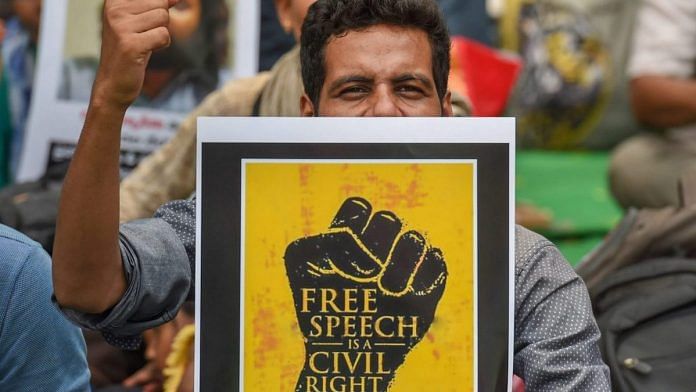Thank you dear subscribers, we are overwhelmed with your response.
Your Turn is a unique section from ThePrint featuring points of view from its subscribers. If you are a subscriber, have a point of view, please send it to us. If not, do subscribe here: https://theprint.in/subscribe/
In any democracy, what one says is often less significant than how and why it is said. A mature and responsible public discourse requires that criticism be directed at actions, policies, and outcomes rather than at individuals or personalities. Unfortunately, in today’s political and media climate, this distinction has all but disappeared. The temptation to sensationalize and personalize has led to a culture where personal attacks replace analytical debate, and “shooting the messenge
r” has become a convenient substitute for reasoned discussion.
When leaders — whether in government, opposition, or public life — become the target of relentless vilification instead of being questioned about their decisions or policies, the public narrative loses coherence. The criticism no longer serves the purpose of accountability; instead, it feeds cynicism and division. This shift from issue-based debate to personality-based confrontation often masks deeper agendas — political, commercial, or ideological — designed to discredit individuals rather than address the real issues at hand. Such tactics undermine participatory democracy, where the essence lies in informed and rational dialogue among citizens.
It is equally disturbing that the public, often unaware of the manipulation at play, becomes a participant in this drama. Many people take the bait and join the campaign, lending legitimacy to half-truths or outright falsehoods. This is partly because the digital ecosystem today is so designed that, at the click of a button, any broadcast or message can be instantly forwarded to countless others — often without verifying or even understanding its content. The number of forwards, “likes,” or “shares” is misleadingly touted as a measure of authenticity. In this echo chamber, repetition substitutes for truth, and emotion overrides evidence.
This environment creates a dangerous illusion of collective wisdom — where popularity determines credibility. A well-crafted falsehood, once amplified across platforms, begins to sound truer than a fact-based, balanced report. The consequences are grave: reputations are destroyed, public trust erodes, and democratic debate degenerates into digital mob behavior.
The media, which should ideally act as a moderating force and an instrument of public education, often ends up complicit in the same game. Instead of questioning sources, checking facts, and providing context, sections of the media willingly amplify noise over substance. The lure of instant attention and the pressure to stay “trending” push even established outlets toward sensationalism. Balanced reporting, which demands time, diligence, and restraint, becomes an exception rather than the rule. In doing so, the media abdicates its primary duty — to inform and empower the public with verified, contextual, and balanced information.
Ironically, when authorities or institutions attempt to curb fake news, online defamation, or orchestrated misinformation, the same media often frames these efforts as attempts to “strangulate” freedom of expression or to “muzzle” the press. The narrative of victimhood is quickly adopted, diverting attention from the real issue — the need to maintain credibility, ethics, and accountability in public communication. While free speech is the cornerstone of democracy, freedom cannot mean freedom from responsibility. Every right carries a corresponding duty, and for the media, that duty is to uphold truth and fairness.
The explosion of social media platforms has created millions of “micro broadcasters” who forward, repost, and comment — often with little or no understanding of the subject. In this landscape, rumor and propaganda often travel faster than facts. This democratization of communication, while empowering in theory, has also blurred the line between information and manipulation.
Therefore, the answer lies not in censorship, but in discernment. The public must cultivate the discipline to follow only those sources that repeatedly demonstrate credibility — sources that tell both sides of the story and allow the reader to form an independent judgment. News that acknowledges complexity and presents differing viewpoints may seem less exciting, but it is far more valuable for a functioning democracy. Citizens must learn to pause before sharing, to question before believing, and to verify before amplifying.
Media literacy should be treated as a civic skill — as essential as reading and writing. People must be encouraged to identify bias, to differentiate between opinion and fact, and to recognize when an agenda is being pushed under the guise of news. Schools, universities, and even workplaces can play a vital role in nurturing critical thinking and responsible communication.
Ultimately, participatory democracy thrives not on noise but on knowledge. The health of a democracy depends as much on an informed citizenry as on accountable institutions. When critique is honest, evidence-based, and aimed at improving governance, it strengthens the system. When it degenerates into character assassination and rumor-mongering, it weakens the very fabric of public trust.
The task before us, therefore, is twofold — to demand higher standards from the media and to practice restraint and responsibility as consumers of information. Only when both sides of this communication chain act with integrity can the promise of democracy be fully realized.
Col KL Viswanathan
(The author is an Indian Army veteran and a contemporary affairs commentator. The views are personal. He can be reached at kl.viswanathan@gmail.com )
These pieces are being published as they have been received – they have not been edited/fact-checked by ThePrint.


